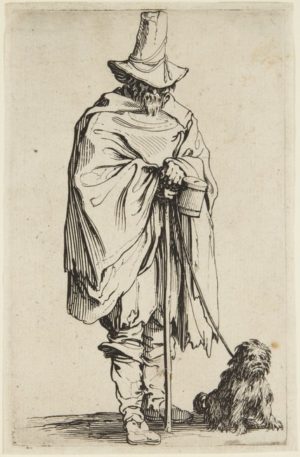
Thomas Hood, an English journalist, humorist, and poet who died 175 years ago, was a complex chap. Particularly known for his light verse and puns, he left behind a body of work that also included expressions of protests against the social evils of the day, namely sweat labor, unemployment, and the double sexual standard. Still, it’s his sense of humor – or at least what was considered humorous at the time – that philologists of his work note today.
Dogs were often a subject, and in his “Dog-grel Verses by a Poor Blind,” (a pun on doggerel, a form of poetry irregular in rhythm and in rhyme) he mentions breed names:
Oh what shall I do for a dog?
Of sight I have not a particle;
Globe, Standard, or Sun,
Times, Chronicle—none
Can give me a good leading article.
A Mastiff once led me about,
But people appeared so to fear him—
I might have got pence
Without his defense,
But Charity would not come near him.
A Bloodhound was not much amiss,
But instinct at last got the upper;
And tracking Bill Soames
And thieves to their homes,
I never could get home to supper.
A Foxhound once served me as guide,
A good one at hill and at valley;
But day after day
He led me astray,
To follow a milk-woman’s tally.
A Turnspit once did me good turns
At going and crossing and stopping;
Till one day his breed
Went off at full speed,
To spit at a great fire in Wapping.
A Pointer once pointed my way,
But did not turn out quite so pleasant;
Each hour I’d a stop
At a poulterer’s shop,
To point at a very high pheasant.”
A Pug did not suit me at all;
The feature unluckily rose up,
And folks took offense
When offering pence
Because of his turning his nose up.
A butcher once gave me a dog,
That turn’d out the worst one of any;
A Bull-dog’s own pup—
I got a toss up,
Before he had brought me a penny.
My next was a Westminster dog,
From Aistrop the regular cadger;
But, sightless, I saw
He never would draw
A blind man as well as a badger.
A Greyhound I got by a swop,
But, Lord, we soon came to divorces;
He treated my strip
Of cord like a slip,
And left me to go my own courses.
A Poodle once towed me along,
But always we came to one harbour;
To keep his curls smart,
And shave his hind part,
He constantly called on a barber.
My next was a Newfoundland brute,
As big as a calf fit for slaughter;
But my old cataract
So truly he backed,
I always fell into the water.
I once had a Sheep-dog for guide,
His worth did not value a button;
I found it no go,
A Smithfield Ducrow,
To stand on four saddles of mutton.
My next was an Esquimaux dog,
A dog that my bones ache to talk on;
For picking his ways
On cold frosty days
He picked out the slides for a walk on.
Bijou was a ladylike dog,
But vexed me at night not a little;
When tea-time was come
She would not go home
“Her tail had once trailed a tin kettle.
I once had a sort of a Shock,
And kissed a street post like a brother,
And lost every tooth
In learning this truth—
One blind cannot well lead another.
A Terrier was far from a trump,
He had one defect, and a thorough:
I never could stir—
’Od rabbit the cur!—
Without going into the Borough.
My next was Dalmatian, the dog!
And led me in danger, oh crikey!
By chasing horse heels,
Between carriage wheels,
Till I came upon boards that were spiky.
The next that I had was from Cross,
And once was a favourite Spaniel
With Nero, now dead,
And so I was led
Right up to his den like a Daniel.
A Mongrel I tried, and he did,”
“As far as the profit and lossing;
Except that the kind
Endangers the blind,
The breed is so fond of a crossing.
A Setter was quite to my taste,
In alleys, or streets, broad or narrow;
Till one day I met
A very dead set
At a very dead horse in a barrow.
I once had a dog that went mad,
And sorry I was that I got him;
I came to a run,
And a man with a gun
Peppered me when he ought to have shot him.
My profits have gone to the dogs,
My trade has been such a deceiver,
I fear that my aim
Is a mere losing game—
Unless I can find a Retriever.
•••••••••••••
We confess that some of the poem flies by us. We don’t know the meaning of the line, “The next that I had was from Cross,” nor what a “Westminster dog” is. We can, however, shed some light on what an Esquimaux is, in large part because one was shown for the first time at the Westminster Kennel Club Dog Show in 1894. It was exhibited there again in 1896 and ’97, and every year from 1903 to to 1906, and again from 1918 to 1923. The last time the breed was exhibited at WKC under that name was 1930.
We don’t know when the breed’s name changed from Esquimaux, but depending upon the source, today these dogs are known as either the Canadian Eskimo Dog, or the Eskimo Spitz. It may even have been the American Spitz, a name that was changed in 1917 to the American Eskimo Dog.
Image: “The Blind Man and his Dog” etching from the series, “The Beggars” by Jacques Callot (1592–1635)
